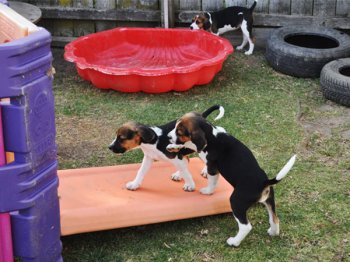
MPI mainly uses beagles as detector dogs. Harrier hounds look like beagles but are much taller, making it easier to sniff travellers’ backpacks and baggage stacked high on airport trolleys for biosecurity risk items.
Collectively known as ‘N-litter’, the six new puppies will be the first harriers to undergo full training as biosecurity detector dogs, says Brett Hickman, MPI Detection Technology Manager. “We’re excited about the prospect of putting the pups right through our puppy walking and training programme and equipping them with the full range of biosecurity detection skills.”
By the end of their training they will be able sniff 35 base odours, including fruit, vegetables, meat and plants – items that could carry harmful pests or diseases into New Zealand.
MPI acquired the puppies from the New Zealand Hunts’ Association last month and will look for potential breeding animals from the litter.
“We want to cross the harriers with beagles that have already established themselves as detector dog stars. That will increase the genetic diversity of our detector dogs, and will see the introduction of taller dogs in future generations under our breeding programme,” Hickman says.
The pups are due to go to foster homes in Auckland and Hamilton in the next few weeks. This will help them become used to being around people and different environments.
MPI has two other harrier hounds – one working as a biosecurity detector dog and one in training. Both started their training as adolescents.



 Classifieds
Classifieds

